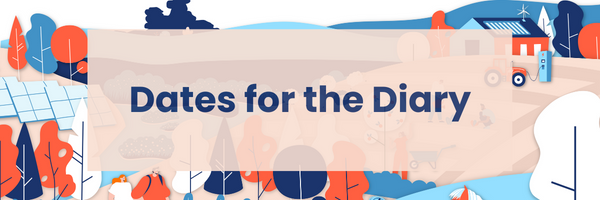Welcome to the Climate Awareness Partnership Sidmouth!
The project to raise awareness of the climate – and our collective action to address it in the Sid Valley.
Founded in 2022, we are a partnership of Sidmouth Town Council and other local organisations – including the Sidmouth Churches, the Sidmouth Plastic Warriors , the Sidmouth Science Festival , Sidmouth schools and the Vision Group for Sidmouth
We are open to anyone living or visiting or interested in the Sid Valley community
Our aims include organising events, publicising support on reducing our carbon footprint, looking for opportunities to live more sustainably and celebrating success through the media.
Come join us at CAPS!
Welcome to the CAPS monthly newsletters!
Welcome to the first Climate Awareness Partnership newsletter of 2026.: CAPS January 2026 Newsletter
And welcome to the new-look newsletter – based on the excellent newsletters from the Devon Climate Emergency.
With thanks to the Devon Climate Emergency, where you can get more news on what’s happening in the county and sign onto their monthly newsletter.
The newsletters from the Climate Awareness Partnership Sidmouth will look at the positive stories of what’s happening in the Sid Valley and East Devon when it comes to reducing our carbon footprint and living more sustainably.
And if you have any local news and stories around the climate, do get in touch @ https://caps.vgsidmouth.co.uk/contact-us

…
Devon schools joining forces for a greener future
“Schools across Devon are taking big steps towards sustainability after a successful Schools Sustainability Conference last month.”

.
For more info: Devon schools join forces for a greener future – News
Meanwhile, CAPS is working with schools across the Sid Valley to engage on the climate: more to come!
…
Councils investing in renewables
More than £1m is to be borrowed to fit six buildings with solar panels, a city council has said. Exeter City Council estimated the initiative would save it about £100,000 every year and cut emissions.

.
More info at Exeter City Council to borrow more than £1m for solar panels – BBC News and, re the picture, at Acting locally on climate change: solar energy – Vision Group for Sidmouth
Should Sidmouth and East Devon councils be doing the same…?
…
New Year, Net-Zero You
We can get the latest climate change news from East Devon thanks to the district council – with this week’s here:
The start of a new year is the perfect time to reflect, reset, and try something new. As we head into 2026, small changes to our everyday habits can add up to a big difference for our planet – and often save money and improve wellbeing too.

.
Here are some easy ways to kick-start your New Year, New Habits journey…
With more at: Kick start 2026 with small,… – East Devon District Council | Facebook
…
Happy New Year from the Nature Zone! 

The latest from Sidmouth Library:
.Do you have a resolution for the New Year that is eco themed? Or would you like some ideas of what you could try this year?

.
Pop in and share your resolution at the Nature Zone, or read other ones to give you some inspiration.
For more see:
Sidmouth Library Nature Table | Happy New Year from the Nature Zone | Facebook
…
Sidmouth Arboretum reaches its target!
From the latest newsletter:
We have now passed the 14,000 target, but we are not stopping.
In 2022 the Environment Committee of Sidmouth Town Council challenged us to plant 14,000 young trees, one for every resident of the valley.

.
However, we are not stopping because planting hedgerows makes a great contribution to the natural health of the valley. The hedgerows provide valuable habitats for a range of flora and fauna and, if placed strategically, they help to slow run off into the river system after heavy rain, a project for the River Sid Catchment Group.
With more here: WE DID IT – 14,000 PLANTED – Sidmouth Arboretum
And to subscribe to the newsletter:
Sidmouth Arboretum – Caring for the trees of the Sid Valley
…
Kennaway House looking to bring back the Farmers’ Market! Suggestions welcome!
From their latest newsletter:
Another notable development will be in the market area around the car park, as we intend to run more regular market events, including a Farmers’ Market, which is due to start in Mid March. Suggestions for or from potential traders are always welcome.
With a photo here of the 2020 Food Fair – and see the piece from 2022:
Could the Sidmouth Farmers’ Market make a come-back?

.
For more, check out: What’s On at Kennaway House Sidmouth | Upcoming Events
And if you have any suggestions, Contact Kennaway House | Sidmouth
…
Future-proofing Sidmouth:
sharing realistic and positive stories
As we enter the New Year, here’s a good look ahead…

.
With some ideas and inspiration at Future-proofing Sidmouth: sharing realistic and positive stories – Climate Awareness Partnership Sidmouth
The climate crisis has a communications problem. How do we tell stories that move people – not just to fear the future, but to imagine and build a better one? This is the question at the heart of our Climate Storytelling series, a collaboration between The Conversation’s Environment and Arts teams that is exploring how arts and science can join forces to spark understanding, hope and action.
From climate storytelling – News, Research and Analysis – The Conversation

…
‘Confluence – the River Sid and its tributaries’ | to March a new free public art display @ the Riverside ArtSpace
Looking after our river is key to managing our fragile environment – and over the last months, the Sidmouth School of Art has put together an extraordinary and ambitious project.

.
The Confluence – the River Sid and Its Tributaries project brings people, ideas, knowledge and action together to protect, conserve and enhance the river and its tributaries.
For more info: ‘Confluence – the River Sid and Its Tributaries’ – a new free public art display at the Riverside Art Space – The Sid
…
Engaging with community groups
CAPS talk to the East Devon Luncheon Club
20th January | Victoria Hotel
As part of the ongoing CAPS project to engage with groups across the Sid Valley, Dave Bramley of CAPS will be giving a talk on raising awareness of climate change and what we as individuals can do to help to the East Devon Luncheon Club.

Dave will be covering topics such as carbon foot-printing, travel, goods and services, computer and internet energy, climate, farming, domestic renewable technology, making properties more comfortable and sustainable.
If you would like CAPS to come along and get some discussion going on the climate in your group, get in touch with us @ https://caps.vgsidmouth.co.uk/contact-us
…
Café Scientifique:
Water – The Ultimate Disruptive Energy Source?
3 – 4.30pm | 20th January | Kennaway House
Evan Parker, Terry Whall and Keith Miller
To create a sustainable future, energy must – critically – be universally accessible, affordable and possess a minimal carbon footprint. The urgent need for solutions for the world’s energy infrastructure is accepted by most but despite the hype, clean energy systems (eg solar, wind, fission) will struggle to supplant fossil energy at global scale any time soon.

.
Energy cell technology can be scaled up to meet a large fraction of total energy modern society requires.
Everyone welcome. Entrance £2.50 to include a hot drink.
For more info: Café Scientifique: Water – The Ultimate Disruptive Energy Source? – Sidmouth Science Festival
…
The Sidmouth Repair Café returns!
Saturday 31st January | St Francis Church Hall, Woolbrook

.
For more info: https://www.facebook.com/sidmouthrepaircafe/
Find us on social media with daily news and stories: . Our mailing address is:info@caps.vgsidmouth.co.uk |